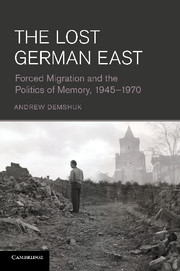Crossref Citations
This Book has been
cited by the following publications. This list is generated based on data provided by Crossref.
Demshuk, Andrew
2012.
What was the “Right to theHeimat”? West German Expellees and the Many Meanings ofHeimkehr.
Central European History,
Vol. 45,
Issue. 3,
p.
523.
Iriye, Akira
2013.
Global and Transnational History.
p.
36.
Goral, Pawel
2014.
Cold War Rivalry and the Perception of the American West.
p.
34.
Kind-Kovács, Friederike
2014.
Memories of ethnic cleansing and thelocalIron Curtain in the Czech–German borderlands.
Nationalities Papers,
Vol. 42,
Issue. 2,
p.
199.
Luppes, Jeffrey
2014.
The Aesthetics of Collective Innocence: Shifting Narratives about Flight and Expulsion afterOstpolitik.
Seminar: A Journal of Germanic Studies,
Vol. 50,
Issue. 1,
p.
83.
Picard, Lionel
2015.
Leadership and Uncertainty Management in Politics.
p.
217.
Atzili, Boaz
and
Kantel, Anne
2015.
Accepting the Unacceptable: Lessons from West Germany's Changing Border Politics.
International Studies Review,
p.
n/a.
Baranowski, Shelley
2016.
Vertriebene and Pieds-Noirs in Postwar Germany and France.
p.
35.
Weger, Tobias
2016.
L’imaginaire Cartographique de « L’est Allemand » dans les Publications Populaires en Allemagne.
Revue d’études comparatives Est-Ouest,
Vol. N° 47,
Issue. 1,
p.
23.
Głowacka-Grajper, Małgorzata
2016.
Transmisja pamięci. Działacze „sfery pamięci” i przekaz o Kresach Wschodnich we współczesnej Polsce.
von Blanckenburg, Christine
2016.
Return Migration and Regional Development in Europe.
p.
261.
Weger, Tobias
2016.
L’imaginaire Cartographique de « L’est Allemand » dans les Publications Populaires en Allemagne.
Revue d’études comparatives Est-Ouest,
Vol. 47,
Issue. 01-02,
p.
23.
Borutta, Manuel
and
Jansen, Jan C.
2016.
Vertriebene and Pieds-Noirs in Postwar Germany and France.
p.
1.
Penny, H. Glenn
2017.
Material Connections: German Schools, Things, and Soft Power in Argentina and Chile from the 1880s through the Interwar Period.
Comparative Studies in Society and History,
Vol. 59,
Issue. 3,
p.
519.
Głowacka-Grajper, Małgorzata
2018.
Women’s Narratives and the Postmemory of Displacement in Central and Eastern Europe.
p.
199.
Karch, Brendan
2018.
Nation and Loyalty in a German-Polish Borderland.
2018.
Nation and Loyalty in a German-Polish Borderland.
p.
295.
Mitroiu, Simona
2018.
Women’s Narratives and the Postmemory of Displacement in Central and Eastern Europe.
p.
1.
ALMAGOR, LAURA
2018.
Fitting theZeitgeist: Jewish Territorialism and Geopolitics, 1934–1960.
Contemporary European History,
Vol. 27,
Issue. 3,
p.
351.
Narvselius, Eleonora
2018.
Demonized, domesticated, virtualized: fortification buildings as a case of Prussian heritage in present-day Kaliningrad.
Nationalities Papers,
Vol. 46,
Issue. 3,
p.
400.





